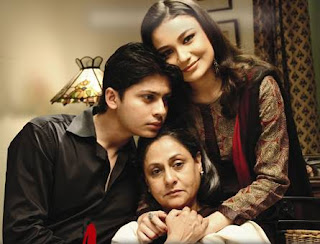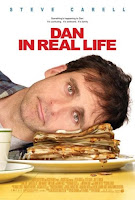
Friday April 11th 2008. Fame Adlabs Multiplex, Andheri, Mumbai - The 11.15 p.m. show.
Dan In Real Life is essentially a romantic comedy (romcom), albeit of the much-abused feel-good variety, a genre who’s abuser & the abused is ironically the very same entity – Hollywood.
Television’s Steve Carell & French thespian Juliette Binoche star in this film about a widowed-father-of-three-daughters, & a good-parenting columnist, finding love in a least likely source - his younger brother’s girlfriend Marie (Binoche). The first indicator of this love, you’ll notice, happens to be an unlikely one too.
Film opens with Steve Carell’s Dan shaking his morning l’ennui off the bed, & starting the day with sorting clothes for/from wash. One particular curious piece of clothing, belonging to one of his daughters, seems to disturb Dan no end, considering his being a responsible single parent &, according to the 15 yr-old owner of the thong panties, a monk. This 2nd daughter of his, & the actor playing the role, for the rest of the film, bears the misfortune of mostly shown her posterior first, seen through Dan’s POV, before settling elsewhere. The father is carting his three daughters (17, 15, & an indeterminate-aged little one) to his family’s annual get-together in Rhode Island.

The lengthy prologue of the film would move into ‘film actual’ only after Dan meets, & spends hours talking to, the intended paramour in Marie (Juliette Binoche). As soon as you get to the point in the film where a supposedly crucial conversation between the protagonists is taking place across a diner/café table, music starts blending in, their time starts lapsing with numerous dissolves, of course you don’t know what they’ve been telling each other, and you know you’re not watching a real film. It’s a romcom, for who's ever sake.
It is here, while Dan/Carell is driving back home that this love’s first indicator, a novel one, pops-out; a ticket for reckless driving (for endangering other motorists) that’s warranted by, usually & in this case, an Unbearable Lightness of Being. This device is milked a couple more occasions in the film, whenever there’s doubt about the protagonists’ resolve vis-à-vis one other. By the close of the film, Dan/Carell ends up without a driving license, happily so.
Dan’s daughters terrorize the father, as daughters usually, I couldn’t be too sure myself, tend to. And the rest of the family members seem to be doing their own thing, while Marie/Binoche & Dan/Carell play-out their mutual affections secret from the rest of the unsuspecting family. Boyfriend Brother loses the girl as the girl’s now interested in the other brother (Dan) Who Is The Copyrights Owner Of The (Saccharine) Lines Used In The Seduction Of Marie. When all seems lost, it is indeed Dan’s daughters who urge/advice the father to Go For It (aka Go for the Girl). A la Anupam Kher from Dil Hain Ki Manta Nahin & Dilwale Dulhania Le Jayange, for the benefit of Aamir Khan & Shah Rukh Khan respectively.
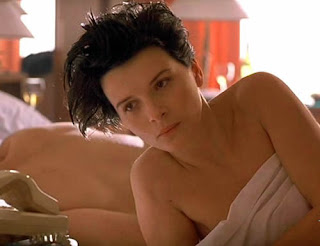
Dan In Real Life, and films of the kind, can be construed of as being fun to watch, as far as they don’t get annoying. One such annoyance brings us to the curious case of (a nude) Juliette Binoche. Dan/Carell tumbles into Marie’s bath, while she’s at a face-wash, expressing his resolve to fight not only his attraction for her but also her own for his hurt self. The 17 yr-old, his eldest daughter, has pushed her way into the bath too, seemingly to talk to Marie, forcing the father into hiding in the bathroom. The teenager makes a monologue, every now & then egging Marie/Binoche to get further in her preparations for her shower, letting her father bear the brunt of an alternating cold/ hot/ steam shower while in hiding in the bathtub behind a useful screen. The teen promises not to look, & urges Binoche to get on with her shower while she shall continue her pointless (s)talking. Binoche joins us, who have been with Carell in the tub behind the screen, with her clothes on. The persistent laddie now asks Binoche to get rid of her clothes, to which the beautiful Juliette Binoche duly obliges, peeling her clothes off while Carell’s Dan seems to be least interested-in, & as audience members, & admirers of the actress, we are praying she refrains from doing this to us. There need not be so much grief associated, for an innocent audience member, over an actor’s disrobing for the camera.
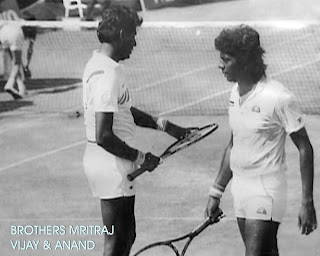
Now we have the Amritrajs. I’ve always taken great pride in, & keenly followed, the exploits of the Amritrajs – Vijay, Anand, & Ashok. Their mother, a Dravidian, had a curious theory concerning her sons’ dark-skinnedness, & what she was hoping to achieve through their marriages. The good-humored lady spoke about how she was bringing fair-complexioned daughters-in-law into the fold, hoping to dilute the family’s skin-color over the subsequent generation. I don’t know of the others from the (family’s) next generation but the one seen in action yesterday (Prakash Amritraj), shows no sign of dilution in pigmentation. It’s indeed fortunate for Indian Tennis that there seems to be absolutely no signs of dilution in talent either, witnessed in Prakash’s braveheart effort in the Davis-Cup tie.


Steve Carell, (who somewhat looks like a Caucasian version of one of the Amritrajs - Hollywood producer Ashok Amritraj) & the film’s makers display their attempt at diluting Dan in real life’s patently TV format, & the lead actor’s un-mistakable TV behavior by casting one of the actresses (Binoche) that has come to exemplify the cinematic in cinema. While the con seems to have been the make believe that Ms. Binoche has walked into this present film straight from her similar personifications in Leos Carax’s Les Amants du Pont-Neuf (The Lovers on the Bridge) & Louis Malle’s Damage from the previous decade, it doesn’t quite pay-off what with the whole film playing like an American Sitcom. Majority of the film is set in interiors, mostly in the Living Room, reiterating the impression that America lives in its living. It is strange though, that so much of American TV is made to exist in the living, beamed to millions of livings, but rarely do the livings on these TV shows possess a TV. In Dan In Real Life the hierarchs (matriarchal, patriarchal, fraternal, & sometimes the filial too) are all control freaks, colonizing every waking moment of the participants of this annual ritual, summoning each one’s presence in the living where all of them appear to be a-living.
The film’s unsuspectingly lengthy epilogue is laced with the columnist’s column - not unlike some films existing for the sake of the film’s poster – the first time we are made privy to the goings-on in Dan’s columns that have now bagged a syndication deal.And while they're at it, why wouldn’t a romcom make use of a wedding, of its couple, over its end credits where musicians play for the extended family to soak-in the proceedings, before inviting the couple over next year's 'Control' gathering.
Friday April 11th 2008. Fame Adlabs Multiplex, Andheri, Mumbai.
It’s 1.15 a.m. now. The New Link road. There are cars lined-up along the multiplex’s lane, like they usually are, but, in retrospect, shouldn’t have been in the first place. There are about 20 other cars but it is a Black Hyundai Accent that seems bizarrely curious. It is, reportedly, a first – for the car, for the investigating cops, probably for the perpetrators, & definitely for the unfortunate owner of the car - who’s me, i, moi. The car’s been bonnet-jacked - a car stripped of its bonnet, while the rest of the machine seems, at this juncture, intact. Maybe the worry would’ve been entirely different if the vehicle weren’t to start or be mobile, but being de-nuded of its bonnet (a frontal abode of crucial functions, protruding parts that were never meant to be exposed) feels violated. A couple of hundred meters’ drive between Fame Adlabs multiplex & the nearest Oshiwara police station was a humiliatingly harrowing journey, feeling naked (while fully clothed), having only a very transparent glass windshield for cover, trying to understand the nature of a crime that belies, as yet, comprehension.
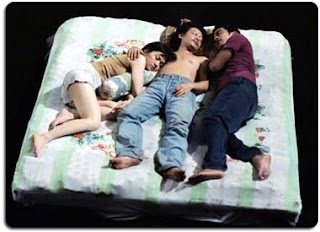
In columnist/tabloid-reporter style, i solicit any spotting of a TsaiMingLiang-like scene (am thinking of the crude transport of a mattress in I don’t want to Sleep Alone) of a few (human) beings carrying a not-really-a-pocket-sized-article of a car bonnet, you would be rendering a great turn in letting either the Dans in real life know of the same, or let the reviewer know of the same on his review/ blog/ mail. The Oshiwara police, I must say, were very amiable, as much as the cops from Joon-ho Bong’s Memories of Murder, working the nights & being as helpful as is possible, considering they haven’t heard of a bonnet-jacking, until now. I wish I had the strength to proclaim my address, the site of the automobile’s location, & dare thieves to meddle with my vulnerably stripped Accent. Instead, i only could come-up with reviewing the film, in exactly the same manner it fared-out for this audience member, during the course of whose playtime a car’s life changed irrevocably, & it’s owner has no clue what else is in store for him.
Tsai-Ming Liang, I do want to sleep, alone.
